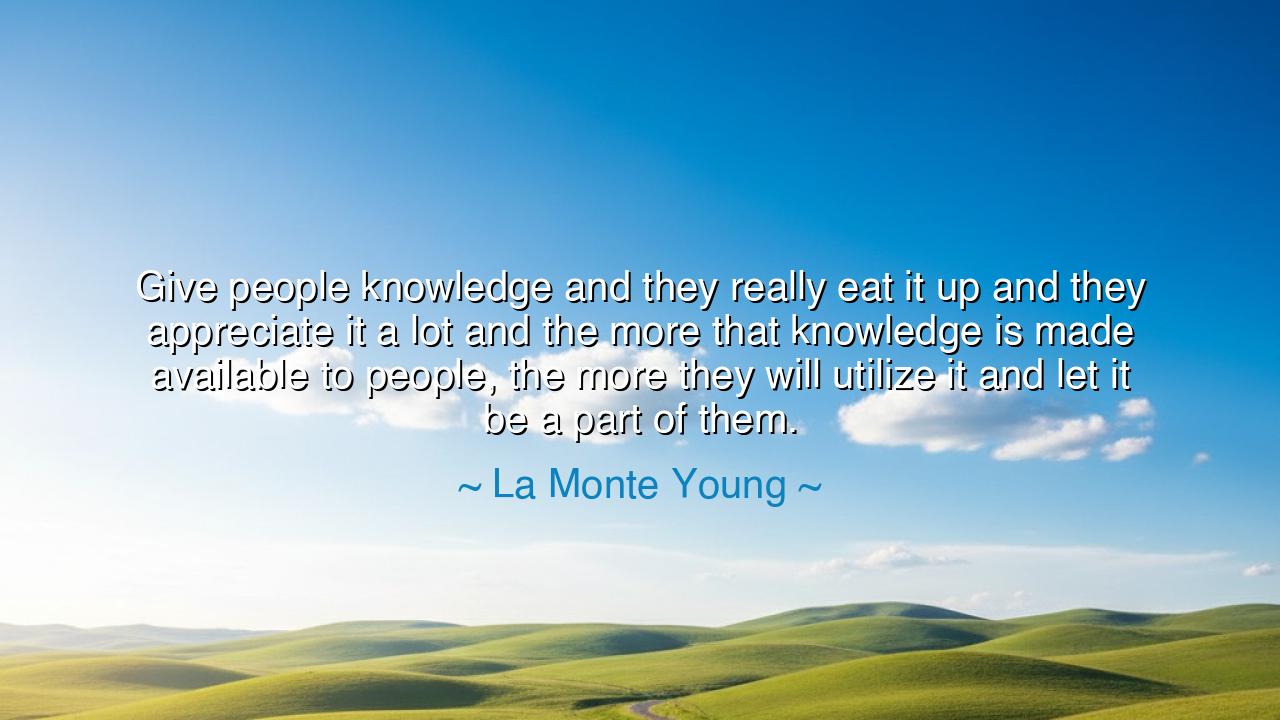
Give people knowledge and they really eat it up and they
Give people knowledge and they really eat it up and they appreciate it a lot and the more that knowledge is made available to people, the more they will utilize it and let it be a part of them.






“Give people knowledge and they really eat it up and they appreciate it a lot, and the more that knowledge is made available to people, the more they will utilize it and let it be a part of them.”
Thus spoke La Monte Young, the visionary composer whose music stretched beyond sound into the realm of eternity, who believed that art and understanding belong not to the few but to the whole of humanity. His words are not merely a reflection on learning, but a testament to the sacred hunger that dwells in the human spirit — the hunger for knowledge, the desire to comprehend, to grow, to transcend ignorance. For to give people knowledge is not to burden them with facts, but to feed the soul, to nourish that inner flame which has burned within mankind since the dawn of consciousness.
When Young declares that people “eat it up,” he speaks of knowledge as sustenance, as something vital to life itself. Just as the body withers without food, so too does the soul decay without understanding. Knowledge is nourishment — it strengthens the mind, refines the heart, and gives structure to thought and purpose to action. And when it is shared freely, when it is offered not as a privilege but as a gift, it awakens gratitude and wonder. The one who receives knowledge feels not merely enlightened but empowered, for within every lesson lies a spark of transformation. Knowledge is the seed of freedom — the first step by which a human being ceases to be a mere creature of circumstance and becomes a creator of destiny.
The origin of this quote arises from Young’s deep conviction that creativity and wisdom are not possessions of the elite, but inheritances of all. As a pioneer of minimalist music, he sought to remove barriers between artist and audience, between knowledge and access. He saw that when knowledge — whether artistic, scientific, or spiritual — is withheld, society starves; but when it flows openly, like a river through the fields of human endeavor, it cultivates new life. His faith in knowledge was, therefore, an act of faith in humanity itself — a belief that, given understanding, people will not sink into chaos, but rise toward their better nature.
History, too, bears witness to this truth. When the philosopher Socrates walked the streets of Athens, he did not hoard his wisdom nor sell it for gold. He gave it freely — questioning, conversing, awakening the minds of merchants, soldiers, and youths alike. He believed that all men, if guided toward reflection, could discover truth for themselves. And indeed, from his open exchange of ideas, an entire civilization’s philosophy blossomed. Knowledge shared became knowledge multiplied — it lived in Plato, then in Aristotle, then in all who followed. Like light passed from lamp to lamp, its brilliance did not diminish; it grew. So it is with all truth: the more it is given, the more it lives.
But there is another layer to Young’s wisdom — that knowledge must be made available. For knowledge locked away in libraries, hidden in institutions, or obscured by pride and complexity, is like grain stored while people hunger. The teacher who shares openly, the artist who reveals his method, the scientist who explains his work — these are the true benefactors of humankind. To withhold understanding is to preserve power for the few; to share it is to empower the many. And once people taste it, as Young says, they “let it be a part of them” — they weave it into their lives, their speech, their choices. Knowledge ceases to be abstract and becomes living wisdom — transforming thought into action, and action into progress.
Consider how this truth shaped the Renaissance, that rebirth of art and science. When the knowledge of the ancients, long buried in monasteries, was rediscovered and translated, Europe awoke as from a long sleep. Artists studied anatomy, scholars revived philosophy, and explorers sought the edges of the world. The light of shared knowledge illuminated every corner of human activity. The people “ate it up,” as Young would say, and civilization itself was reborn. From this we learn that the flow of knowledge is not a luxury of peace — it is the heartbeat of progress. Where knowledge is free, life flourishes; where it is chained, humanity declines.
Therefore, O seeker of truth, take this teaching to heart: do not hoard what you know. Share it — with your friends, your community, your children. Teach without arrogance, listen without prejudice, and pass forward what you have learned, as one flame kindling another. For in giving knowledge, you do not lose it; you multiply it. And when you receive knowledge, let it not rest only in your mind — let it become part of you. Let it guide your hands, temper your words, and lift your thoughts toward higher purpose. For knowledge is not meant to be collected like treasure, but lived like faith.
As La Monte Young reminds us, knowledge is food for the human spirit — an eternal feast in which none need go hungry. To share it is to believe in the dignity of others; to seek it is to honor the potential within yourself. So let the flow of understanding never cease. Let it move from mind to mind, from heart to heart, until the whole world becomes a choir of awakened souls — learning, giving, and growing together in the endless harmony of wisdom.






AAdministratorAdministrator
Welcome, honored guests. Please leave a comment, we will respond soon